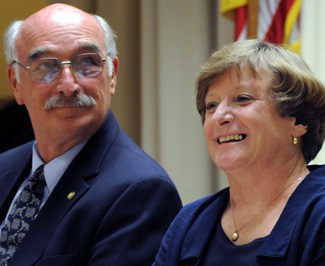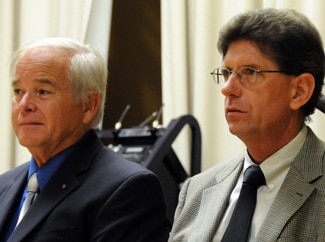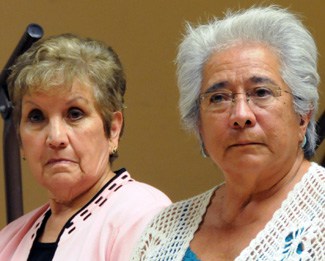
Councilor Sharon Thomas, right, and her opponent Jim Harbison share a laugh at a recent city council candidate forum. (Photo by Heath Haussamen)
In Las Cruces, voters’ options range from ending the progressive majority on the council to increasing it
In 2007, Las Cruces voters overthrew a city council that many viewed as allowing out-of-control growth. They replaced that majority with a so-called progressive council that pledged more transparency and openness and a shift toward more sustainable growth policies.
Those generally considered part of the progressive majority are Councilors Miguel Silva, Nathan Small and Sharon Thomas and Mayor Ken Miyagishima. All were elected in November 2007 except Thomas, who replaced former Councilor Miyagishima in a special election in January 2008.
Two years after being elected, those progressives say they’ve put the city on the path toward greater transparency, citizen accessibility and sustainability. Accomplishments they cite include successfully suing a developer they say didn’t comply with subdivision requirements and hiring a sustainability officer.
Thomas and Miyagishima said in interviews that they are still working on a number of projects that include hiring a police auditor, exploring the creation of a regional recycling program, revitalizing the El Paseo Road area, securing funds and support to build a commuter rail to El Paso and working with El Paso Electric to try to increase the amount of energy from renewable sources the company makes available to residents.
This year, progressive activists in Las Cruces are trying to increase their majority on the seven-member (including the mayor) council by replacing Dolores Archuleta with Olga Pedroza and Gil Jones with Gill M. Sorg. Voters will decide on Tuesday whether to grant progressives a larger majority – or take it away by kicking Thomas out of office.
A council with ‘some very great ideas’

Councilor Gil Jones, right, and challenger Gill M. Sorg at the recent candidate forum. (Photo by Heath Haussamen)
There are plenty who don’t want progressives to have greater control over the city’s direction. Jim Harbison, who is running against Thomas, said he hasn’t seen the progressives on the council “do anything that makes affordable housing any better to retain for the families that live here.” And former Mayor Bill Mattiace, who Miyagishima defeated in 2007, said he doesn’t see anything the progressive council has done as being new.
Mattiace brought up the ongoing work on the Vision 2040 plan. Though progressives often cite that as something on which they’re focusing, the process had begun before 2007, and Mattiace said having such a plan is a federal requirement for cities of 50,000 or more to ensure preparation for the necessary roads and infrastructure.
Mattiace also said he has seen no improvements in regard to civil and human rights since progressives won control of the council.
Thomas, on the other hand, said the council is working on a number of things, including preservation of arroyos for flood prevention and increasing trails and walking and biking paths.
“Walkability always adds value to the neighborhood,” Thomas said. “When you plan a street, you also plan for biking, open space and trails.”
The hiring of Tom Schuster, formerly a long-range planner for the city, as sustainability officer is part of a new strategic plan the council is developing.
“The new council has some very great ideas that pertain to sustainability,” Miyagishima said. “It just makes sense.”
The mayor said the council is working with El Paso Electric to request from the state’s Public Regulation Commission that citizens be allowed to receive most of their electricity from renewable energy sources such as wind, biomass and solar. In addition, he said, the city plans to install solar energy components in the new city hall and convention center, which are both under construction.
Thomas, who represents District 6, said the city is working with the South Central Solid Waste Authority to plan for a curbside recycling program that will begin in District 6.
“For recycling, we need more than just the city,” Thomas said. “It’s taken a while to write up the agreements in order to work on the project from a regional perspective.”
‘There needs to be a council with diversity’

Councilor Dolores Archuleta, left, and challenger Olga Pedroza at the recent candidate forum. (Photo by Heath Haussamen)
Another issue progressives have sometimes raised is dust. John Hummer, chair of the Las Cruces City Chamber of Commerce and a realtor, said he’s concerned that the council may want to tack on higher fees for developers to help fund dust abatement, when he said that it’s agriculture, Elephant Butte Irrigation District ditches and nature that play a bigger role in dust.
Hummer is working against progressives increasing or even keeping their majority in next week’s election. Asked what he believes progressives have done with their majority on the council, he said many issues have been brought up only to go nowhere.
Those include a proposed 1/4 percent “quality of life” tax increase and a proposal from a group of residents to allow the raising of hens in the city limits. Thomas was among those pushing for the allowing of hens, arguing that locally produced food is good for the environment and increases sustainability. Harbison has used that issue to paint Thomas as a radical.
Hummer said the election should be about bringing diversity back to the council.
“If I look at the current city council, speaking as John Hummer, there needs to be a council with diversity that has life experiences such as military and having to meet a payroll, versus isolated special interest groups and ideologies,” he said.
Archuleta wants progressives to keep the majority
Though progressive activists supporting Pedroza, Sorg and Thomas may see the issue as black and white, there isn’t always a clearly defined line between progressives and others on the council. The two councilors progressive activists are trying to unseat this year – Archuleta and Jones – sometimes speak about themes similar to those discussed by progressives. In fact, Archuleta said in an interview that she would like to see progressives maintain the majority on the council.
Archuleta said that she’s pleased with the direction the council has taken since 2007. She said Thomas “does a lot of research” on projects and then presents the facts to the council. Small is good to have onboard, she said, because he represents the younger generation of citizens. She said Silva is very involved in revitalization and cares about what he’s doing.
Jones also sometimes speaks about the same issues progressives raise. In a mailer he sent to voters in his district, Jones spoke about “quality of life,” saying, “as an avid cyclist,” he ran for office four years ago because he “became concerned about traffic congestion, poor flood control, a lack of parks and swimming pools, and no emphasis on smart growth planning.”
“We’ve made great progress in four years, but my work is not yet done!” the mailer states.
Jones’ challenger, Sorg, said he has a positive view of what the progressive majority is doing, and he’d like to “continue helping them.”
“It’s a huge job to plan for the future. They’re on a roll, and we want to keep that roll going,” he said.
‘The newly elected council has increased transparency’
Don Kurtz, a political consultant who lives in Las Cruces and is considered by many to be the mind behind the progressive movement, said progressives bring quality of life issues into the planning process — which includes support for existing neighborhoods – and a focus on increasing transparency in government — which means citizen participation in decisions that affect them.
Miyagishima said the latter is happening.
“The newly elected council has increased transparency and engages residents in meaningful discussions regarding policy — embarking on a new strategic mission on doing those changes,” Miyagishima said.
Kurtz, who worked on the 2007 campaigns to elect Miyagishima and the progressive councilors, is working now for Pedroza, Sorg and Thomas. He said those he worked with in 2007 “are independent of philosophy, and are excellent elected officials who work very hard.”
On the other side, David Roewe, executive director of the Building Industry Association of Southern New Mexico, said he hasn’t seen much change since 2007. His organization has endorsed Archuleta, Harbison and Jones.
Roewe added, “It’s not for me to say; it’s for the citizens to say” who should be elected.
Heath Haussamen contributed to this report.
